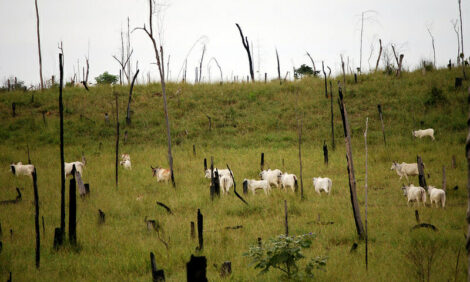



Decrease Stress to Improve Profits
NEW ZEALAND - Cow behaviour expert, Darold Klindworth, says farmers need to identify the signs of cow stress to improve the milking experience for their animals and staff.He says by making a few changes to the milking process, farmers can make a real impact on a farm’s bottom line.
“When a cow is stressed, it can lead to lower milk yields, increased milking time and higher animal health costs. Plus, if your cows are stressed and acting out, that often creates stress for staff as well,” says Mr Klindworth.
“While many cows demonstrate outward signs of stress, some cows do not. That’s why it pays to learn a bit about how cows are naturally hard-wired to react to certain stimuli around them.
“That way, you can create a better milking experience for the animals and farm staff,” he explains.
Mr Klindworth’s ‘Thinking Like a Cow’ workshop is one of 12 seminars on offer to farmers attending the DairyNZ Farmers’ Forum at Hamilton’s Mystery Creek Events Centre on May 23-24. The forum is free to levy-paying farmers and their staff.
Those attending the ‘Thinking Like a Cow’ workshop will get information about stimuli that causes cow stress, how to identify signs of stress and changes to get the best behaviour out of the herd.
Mr Klindworth says the way a cow responds to loud noises, sudden movements or even certain smells is in its evolutionary nature.
“In the wild, dairy cows’ survival depended on their response to activities around them. For instance, their natural response to a sudden movement or noise is to flee. So if a farmer suddenly flaps his arms and shouts, cows will get agitated and flighty rather than choose to walk calmly into the milking shed.”
Mr Klindworth will discuss research that shows if a cow is stressed, the increased adrenalin in her system can adversely affect milk let-down times by as much as 30 minutes. “So, if we can eliminate activities such as forcibly pushing cows into the shed, for instance, we can speed up milking times significantly,” says Mr Klindworth.
Decreasing cow stress can also have a significant impact on animal wellness, he says.
“Stress is one of the many factors that can increase a cow’s probability of being infected with mastitis. Additionally, stressful trips down the race or anxiety due to crowding inside the yard can contribute to lameness.
“In the end, happy cows can lead to a decrease in farm working expenses and increased profitability.”
TheCattleSite News Desk


